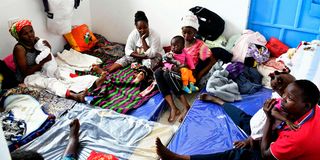I’m empty, I can’t feel myself: The agony of a mother in a flood rescue centre

Mothers and their children inside a classroom at Kahawa Wendani Primary School on May 01, 2024 where they were sheltered after heavy rains on Tuesday evening left their homes flooded.
What you need to know:
- On a fateful night, Elizabeth Machinga and her four children narrowly escaped death as floods ravaged their slum home in Kiambu County.
- Now sheltered with other victims, the single mother grapples with the loss of her belongings and livelihood, leaving her hopeless and uncertain about the future.
On the midnight of Tuesday last week, Elizabeth Machinga was fast asleep in her tiny bed which she shared with her four children in the rickety iron sheet room in Bosnia slum, Kahawa Wendani Ward in Kiambu County.
Suddenly, she was awakened by the rapidly moving iron sheets as her bed touched the walls of the room. She jumped out of bed to find out what was happening only for her to step into a sufuria surrounded by water slightly below the knee.
In no time, the water had swollen shoulders high. She is about four feet tall. She was scared stiff and let out a piercing cry for help. All around her the women and children were screaming with terror. It was all dark. The lights had gone out.
“I thought the day of death had come for me and my children,” she says.
Elizabeth is a single parent heading a household of children aged 12, six, three, and eight months.
Then men came to the rescue of the women and children shaking like a leaf.
“They carried the children to safety over their heads before escorting us here,” says Elizabeth from Kahawa Wendani Primary School where the flood victims are sheltered.
The only thing she saved is herself, her children, the clothes on them and her Kabambe phone, which she held in her mouth, as she pushed against the waters to join her children rescued by the men.

A mother and her child inside a classroom at Kahawa Wendani Primary School in Nairobi on May 01, 2024. She is among residents of Bosnia slums in Kahawa Wendani who were left homeless after Tuesday's heavy rains.
“My children and I would have died if it wasn’t for the men,” she says.
She is relieved she is alive with all her children; but one thing has made her lose all hope in life: the lost property.
Her body twitches when she remembers her gone three-quarter sack of cassava she was selling to feed her family; the Sh300 she had on her that disappeared with the waters, and the room swept away with all she called hers.
“How am I going to start all over again? Where do I go from here? I cannot go back home to my mother in Subukia (Nakuru County). I’ll overburden her with my four children. I don’t have any hope left. I’m empty, I can’t feel myself,” she sighs though with a distant indescribable smile.
Life is not any better in this hosting centre. She is among the 76 women with 102 children, and 47 men flood victims staying here. She is lucky to share a special room dedicated to mothers with children below two years. One woman here has seven-month-old twins and another is nursing a two-week old baby. The oldest, they say, is one year and five months-old.
But they would be joined with another woman who had given birth the previous night. They are lucky because they were the first group of women to be rescued and brought here on April 23, 2024.
Sadly, the rest of the women with children below five years, those pregnant and breastfeeding have to share beds with the rest of the women in the open classrooms.

Residents of Bosnia in Kahawa Wendani, Nairobi County, ponder their next move after heavy rains left them homeless on May 01, 2024. They are currently hosted at Kahawa Wendani Primary School.
Every night, the women receive two diapers, which they say isn’t enough. Those on menses receive the pads on request.
There is, however, no special meal for the mothers like porridge to help in production of adequate breastfeeding milk, neither do they receive more tea or bigger portions of food.
“If you come here at 2am, you’ll find us seated and looking at each other in desperation because our nipples are in hot pain from the children suckling empty breasts. We feel so weak that we have to drag our feet to relieve ourselves,” says Leah Waithera, the woman with twins.
That’s not all. Something else is stressing the women.
“You saw me coming in with a bucket. I had gone to wash my daughter’s clothes. She has been affected by diarrhoea, and I've been told to buy ORS (oral rehydration solution). I don’t have even a cent. What am I going to do?” she asks.
Njambi Chebe, a community health promoter in-charge of the centre, acknowledges the challenges, saying the situation is really overstretching that sometimes the stressed victims insult them, yet they can only do much within their limits.
“Some well-wishers have donated clothes, diapers and pads but it isn’t enough. We share what we have. We actually have a major problem with panties. Women and girls have no panties,” she says.
Last week, Kiambu governor Kimani Wamatangi visited the centre and distributed food and non-food items. Apart from the mattress and blankets, Governor Wamatangi gave them maize and wheat flour, rice, sugar, tea leaves and a bar of soap. A few women also got sanitary towels. There were no diapers, milk or porridge flour.
Kiambu County’s water and environment executive David Kuria, who is heading the disaster response in the county, told Nation.Africa yesterday that different teams had been dispatched to all the affected areas to rescue and assess the situation.
He said the specific needs of women will be addressed as they come.





